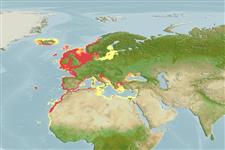Teleostei (teleosts) >
Pleuronectiformes (Flatfishes) >
Soleidae (Soles)
Etymology: Solea: Latin, solea = sandal (shoe); refered to the flat shape of the fish (Ref. 45335).
More on author: Linnaeus.
Environment: milieu / climate zone / depth range / distribution range
Ecology
Marine; brackish; demersal; oceanodromous (Ref. 51243); depth range 0 - 150 m (Ref. 35388), usually 10 - 60 m (Ref. 6302). Subtropical; 8°C - 24°C (Ref. 4944); 64°N - 14°N, 25°W - 38°E (Ref. 54889)
Eastern Atlantic: southward from Trondheim Fjord (including North Sea and western Baltic) and Mediterranean Sea (including Sea of Marmara, Bosporus and southwestern Black Sea) (Ref. 4710). Elsewhere, southward to Senegal (Ref. 4710), including Cape Verde (Ref. 5304).
Length at first maturity / Size / Weight / Age
Maturity: Lm 30.3 range ? - ? cm
Max length : 70.0 cm SL male/unsexed; (Ref. 4710); common length : 35.0 cm SL male/unsexed; (Ref. 5504); max. published weight: 3.0 kg (Ref. 5504); max. reported age: 26 years (Ref. 32766)
Dorsal spines (total): 0; Dorsal soft rays (total): 69 - 97; Anal spines: 0; Anal soft rays: 53 - 80; Vertebrae: 46 - 52. This species is distinguished by the following characters: body oval, flat and asymmetric; eyes located on right side of head, except in reversed individuals (Ref. 57416). Upper eye less than its own diameter from dorsal profile of head (Ref. 4710). Anterior nostril on blind side not enlarged (Ref. 4710, 57416), but surrounded by small rim (Ref. 57416). Its distance from front margin of head 1.5-1.9x in its distance from cleft of mouth; anterior nostril on eyed side with backward-pointing tube not or only barely reaching front border of lower eye (Ref. 4710). Preopercle covered by skin and opercle entirely scaled; mouth arched and inferior; dorsal and anal fins lacking spinous rays and united to caudal fin by well-developed membrane, but caudal peduncle distinct; dorsal fin originating on horizontal axis through upper eye; pectoral fin on eyed side asymmetrical, with 7-10 rays, and on blind side slightly shorter; straight part of lateral line visible, supratemporal part slightly arched above eyes; body covered with rectangular ctenoid scales (Ref. 57416).
Body shape (shape guide): short and / or deep; Cross section: flattened.
Adults occur at a temperature range of 8.0-24.0°C (Ref. 4944). Usually solitary. They burrow into sandy and muddy bottoms. Retreat to deeper water during winter (Ref. 9988). Juveniles are found during the first 2 to 3 years in coastal nurseries (bays and nurseries) before migrating to deeper waters (Ref. 92286). Adults feed on worms, mollusks and small crustaceans at night. Waden sea is the most important nursery area. Batch spawner (Ref. 51846). Recruitment is very variable. Frequently found pelagically during spawning migrations (Ref. 35388). Marketed fresh and frozen; utilized steamed, fried, broiled, microwaved and baked (Ref. 9988).
Spawning takes place in shallow coastal waters at temperatures of 6 - 12°C. Reproduction starts after 3-5 years of age, when 25-30cm size is reached. Spawning happens mainly during the months of February-May (for example, off the coasts of Galicia), although in warmer areas
(such as the Mediterranean), it can occur at the beginning of the winter. Incubation lasts about 5 days (at 1 2°) and larval phase 35 days (at 18°C).
Desoutter, M., 1992. Soleidae. p. 860-865. In C. Levêque, D. Paugy, and G.G. Teugels (eds.) Faune des poissons d'eaux douces et saumâtres d'Afrique de l'Ouest Tome 2. Faune Tropicale n° 28. Musée Royal de l'Afrique Centrale, Tervuren, Belgique and O.R.S.T.O.M., Paris, France, 902. (Ref. 7395)
IUCN Red List Status (Ref. 130435: Version 2025-1)
Threat to humans
Harmless
Human uses
Fisheries: highly commercial; aquaculture: commercial; gamefish: yes; aquarium: public aquariums
Tools
Special reports
Download XML
Internet sources
Estimates based on models
Preferred temperature (Ref.
123201): 9 - 20, mean 11.4 °C (based on 678 cells).
Phylogenetic diversity index (Ref.
82804): PD
50 = 0.5020 [Uniqueness, from 0.5 = low to 2.0 = high].
Bayesian length-weight: a=0.00724 (0.00633 - 0.00829), b=3.07 (3.03 - 3.11), in cm total length, based on LWR estimates for this species (Ref.
93245).
Trophic level (Ref.
69278): 3.2 ±0.1 se; based on diet studies.
Generation time: 3.9 (3.2 - 4.6) years. Estimated as median ln(3)/K based on 31
growth studies.
Resilience (Ref.
120179): Medium, minimum population doubling time 1.4 - 4.4 years (K=0.21-0.33; tm=3-5; tmax=26; Fec=100,000).
Prior r = 0.50, 95% CL = 0.33 - 0.75, Based on 40 full stock assessments.
Fishing Vulnerability (Ref.
59153): Low to moderate vulnerability (35 of 100).
🛈
Climate Vulnerability (Ref.
125649): Moderate vulnerability (38 of 100).
🛈
Nutrients (Ref.
124155): Calcium = 79.8 [29.8, 184.5] mg/100g; Iron = 0.915 [0.416, 1.919] mg/100g; Protein = 18.3 [16.6, 20.1] %; Omega3 = 0.224 [0.141, 0.343] g/100g; Selenium = 17.2 [6.8, 47.5] μg/100g; VitaminA = 4.77 [1.36, 16.81] μg/100g; Zinc = 0.453 [0.263, 1.007] mg/100g (wet weight); based on
nutrient studies.
